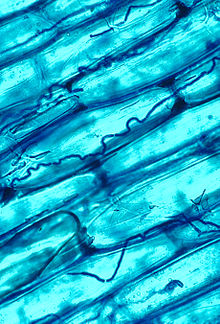
Convolvulaceae, known commonly as the bindweed or morning glory family, is a family of about 60 genera and more than 1,650 species of mostly herbaceous vines, but also trees, shrubs and herbs, and also including the sweet potato and a few other food tubers.

The Clavicipitaceae are a family of fungi within the order Hypocreales. A 2008 estimate placed 43 genera in the family, but recent work has increased this number to 97.

Metarhizium is a genus of entomopathogenic fungi in the Clavicipitaceae family. With the advent of genetic profiling, placing these fungi in proper taxa has now become possible. Most turn out to be the asexual forms (anamorphs) of fungi in the phylum Ascomycota, including Metacordyceps spp.
Berkelella is a genus of fungi within the Clavicipitaceae family.
Balansia is a genus of fungi in the family Clavicipitaceae.
Cordycepioideus is a genus of fungi within the Clavicipitaceae family.
Heteroepichloë is a genus of fungi within the Clavicipitaceae family.

Metacordyceps is a genus of fungi in the family Clavicipitaceae. The anamorphs of Metacordyceps appear to include Metarhizium species.
Moelleriella is a genus of fungi within the Clavicipitaceae family.
Myriogenospora is a genus of fungi in the family Clavicipitaceae.
Sphaerocordyceps is a genus of fungi within the Clavicipitaceae family.
Wakefieldiomyces is a genus of fungi within the Clavicipitaceae family.
Richard William George Dennis, Ph.D., was an English mycologist and plant pathologist.

Lecanicillium lecanii is now an approved name of an entomopathogenic fungus species, that was previously widely known as Verticillium lecanii (Zimmerman) Viegas), but is now understood to be an anamorphic form in the Cordyceps group of genera in the Clavicipitaceae. Isolates formerly classified as V. lecanii could be L. attenuatum, L. lecanii, L. longisporum, L. muscarium or L. nodulosum. For example, several recent papers, such as Kouvelis et al. who carried out mitochondrial DNA studies, refer to the name L. muscarium.
The National Fungus Collections of the United States is the "world's largest herbarium of dried fungus specimens". It is housed within the United States Department of Agriculture (USDA).
Claude Wilbur Edgerton was an American mycologist. He was born in Woodbine, Iowa, and earned a Bachelor of Science degree from the University of Nebraska in 1903, and a PhD from Cornell University in 1908. After this he was employed at Louisiana State University, initially as a plant pathologist in the Agricultural Research Station, and later as Professor and then Head of Botany, Bacteriology, and Plant Pathology in 1924. Edgerton had this position until his retirement in 1950. He was known for his study of sugarcane diseases; his teaching materials formed the basis of the book Sugarcane and Its Diseases, first published in 1955 after his retirement. Species named in honor of Edgerton include Cryptosporiopsis edgertonii and Synchytrium edgertonii.
Polynema is a genus of fungi in the family Clavicipitaceae.
Isaria fumosorosea is an entomopathogenic fungus, formerly known as Paecilomyces fumosoroseus. It shows promise as a biological pesticide with an extensive host range.

Hypocrella is a genus of fungi in the family Clavicipitaceae.
Nomuraea is a genus of fungi in the family Clavicipitaceae.






